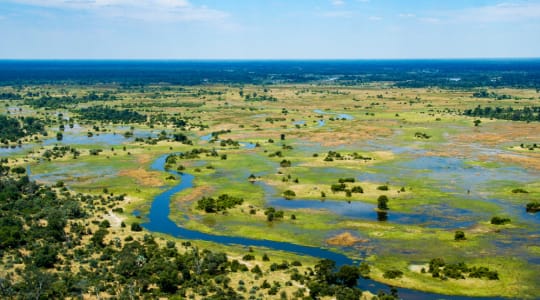
The Okavango Delta is a vast inland river delta located in Botswana, Southern Africa. It is formed by the Okavango River, which flows from the highlands of Angola through Namibia before entering Botswana, where it fans out and forms a labyrinth of channels, lagoons, and islands over an area of about 15,000 square kilometers (5,800 square miles).
The Okavango Delta is a unique and highly diverse ecosystem that supports a wide range of wildlife, including large populations of elephants, lions, leopards, buffalo, and hippos, as well as a rich variety of birdlife, reptiles, and aquatic species. The delta is also home to several indigenous communities, such as the San people, who have lived in the area for thousands of years and continue to practice their traditional way of life.
The delta is a popular destination for tourists and wildlife enthusiasts, who can explore the area on foot, by boat, or on horseback, and observe the abundant wildlife in its natural habitat. The delta is also a designated UNESCO World Heritage Site, recognized for its unique ecological and cultural value.
However, the Okavango Delta is facing several threats, including climate change, poaching, and human encroachment, which are putting its delicate balance at risk. Efforts are being made to preserve the delta and its wildlife, including conservation programs, ecotourism initiatives, and community development projects that aim to promote sustainable livelihoods for the local people while protecting the natural resources of the area.
Explore Near Okavango Delta
Discover 1 attraction within 75km. Perfect for planning day trips, finding connecting flights, or discovering new destinations to explore during your visit.
Nearby Attractions & Places to Visit
1 destination within 30.9km from your location

Cross-Border Adventures Near Okavango Delta
Discover cross-border adventures near Okavango Delta. Explore neighboring countries with similar attractions and extend your travel experience across borders.



